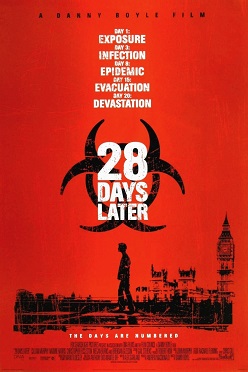
| Director(s) | Danny Boyle |
| Principal Cast | Cillian Murphy as Jim Naomie Harris as Selena |
| Release Date | 2002 |
| Running Time | 113 minutes |
Zombies- check.
Misanthropy- check.
Examination of alienation – check.
Awesome music – double check.
Danny Boyle’s science-fiction zombie film, 28 Days Later, checks off all the necessities of a great movie, adds on a great deal of nuance and criticism, and wraps all of that in a beautifully shot and scored piece. The story follows Jim as he wakes up 28 days after a terrifying “rage” virus has spread and destroyed most of England. He eventually meets up with and forms a rag-tag team with other survivors as they struggle to find a way out of the living hell they find themselves in.
I knew I was in for a cinematic treat just based off of the parallels in the opening scene of the movie, and the opening scene on Jim. We start off looking at a monkey, tied up to a series of wires, being forced to take in violent awful media. When Jim wakes up, he’s also covered in wires on a hospital bed causing an immediate association between him and the primate. It beautifully foreshadows his journey as he’s forced to view and deal with gruesome and morbid scenes of violence. It also raises one of the films main thematic questions- what is humanity and how is it different than animality? Based on this opening scene it might be that humans and animals aren’t so different after all. The feeling never really goes away and the film constantly plays with it.
Every camera shot has a purpose in this movie and I was constantly kept off balance by their variation in use. The use of a gritty realistic recording makes the setting feel grounded and haunting. A darker color scheme is used for most of the film so when lighter ones are front and center, it feels intentional. It serves as a visual and thematic pallet cleanser, which for the most part, keeps the movie fresh and invites deeper answers to the questions being posited.
The frequent use of angled shots highlight the upturned nature of the world around them. Any semblance of the social order that they know of is gone. There are a lot of wide open shots that make the characters feel puny in comparison. They feel like ants- showcasing not only our groups’ alienation, but also questioning the general place of humanity in relation to the planet at large. The quick panicked shots when the zombies come in is also jarring and was frightening each time it was used. The zombies being as fast as they were only made the effects more pronounced.
Speaking of that, I love how fast the zombies were. They’re aggressive killing machines and present a real sense of urgency. The film ensures we know of that by having an incredibly tense and shocking zombie/reaction scene out of nowhere, highlighting the absurdity of it- a mistake at any point, even a small one could be deadly. Even a small speck of blood end our protagonists, so every zombie encounter becomes even worse- we’re constantly on the lookout for blood and cadavers because those present as much of a threat as the zombies themselves.
Because the zombies were so threatening I expected them to be the highlight of the film, driving the main source of tension. But the film spends a large chunk of time developing our group. They really do feel like a family, and some of the character moments in the second act are well realized. They help flesh out the characters without feeling out of place with what we’ve learned about everyone earlier.
John Murphy’s sound makes all of the above elements even better than they would be otherwise. He uses music to precisely accentuate the emotional undercurrent of the scene. The music is never just there for the sake of being there. For example, during one scene in the first act, a soft song plays in the background as the characters explore a certain area, but upon the discovery of a deceased couple, the music cuts out. Instead, the audience is left with silence- highlighting the somber and tragic nature of the scene, before the song comes back in- snapping us, and the character who discovered the scene back to real life. Furthermore, “In the House, In a Heartbeat”, is one of the the best horror/theme tracks I’ve ever heard and its use in the third act was chilling.
The ending of the movie feels rushed and thematically inconsistent, even if I personally thought it was a pleasant change of pace from what I expected. Certain character arcs feel like they come out of left field, but are still beautiful symbolically and thematically. The issue is that after setting up a series of expectations that would allow for the rushed characterization to feel symbolically meaningful, the film directly sidesteps what it just did in favor of something else. The end result, is a surprising ending that a lot of people might find unsatisfying. Personally, I liked it and I’ll get into that in the spoiler section, but I’m definitely going to look at the alternative endings to see if they change my view of the movie at all.
Report Card
| TLDR | 28 Days Later, is a rich and tense zombie film that’ll have you asking questions about the depraved extents we go to survive. Thought it falters in the ending, it is tense and filled with a sense of isolation that lasts until the very last scene. Watch if you enjoy tense and well-paced action scenes, examinations/criticisms of anthropocentrism, or want to watch a beautifully shot and scored work of art. |
| Rating | 9.5/10 |
| Grade | A+ |
Go to Page 2 for my spoiler-full thoughts!